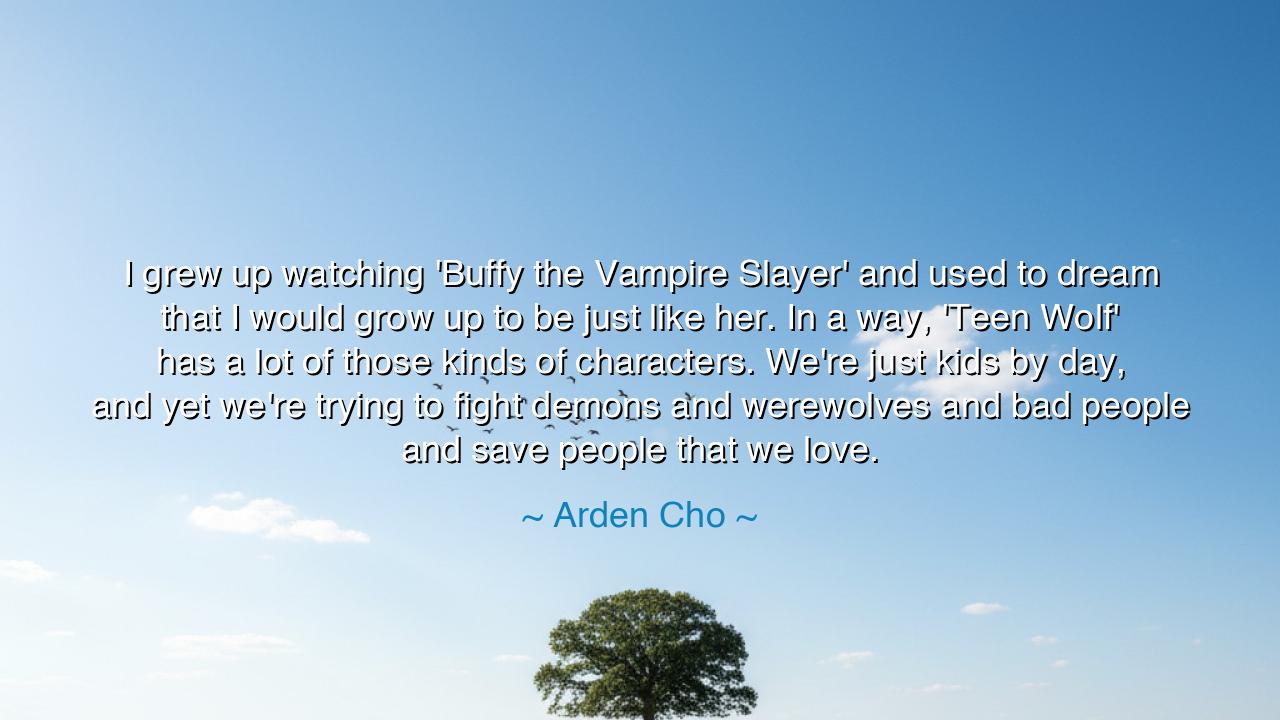
I grew up watching 'Buffy the Vampire Slayer' and used to dream
I grew up watching 'Buffy the Vampire Slayer' and used to dream that I would grow up to be just like her. In a way, 'Teen Wolf' has a lot of those kinds of characters. We're just kids by day, and yet we're trying to fight demons and werewolves and bad people and save people that we love.






Hearken, children of the ages, to the words of Arden Cho, who speaks of the mythic imagination that shapes both youth and destiny: “I grew up watching ‘Buffy the Vampire Slayer’ and used to dream that I would grow up to be just like her. In a way, ‘Teen Wolf’ has a lot of those kinds of characters. We’re just kids by day, and yet we’re trying to fight demons and werewolves and bad people and save people that we love.” Within this confession lies a timeless truth: that the hearts of the young, though tender and vulnerable, are drawn to heroism, to the struggle against darkness, and to the pursuit of courage and virtue, even amidst the ordinary routines of daily life.
The origin of Arden Cho’s reflection lies in the profound influence of storytelling upon the formation of character. Shows like Buffy the Vampire Slayer offered more than entertainment; they served as modern epics, casting adolescent struggles in the grand form of battles against monsters and moral dilemmas. The hero, like Buffy, becomes both a mirror and a beacon, reflecting the desires, fears, and aspirations of the viewer. Teen Wolf, in its own mythology, continues this tradition, blending the mundane with the extraordinary, teaching that even youth—seemingly ordinary by day—can confront the forces that threaten justice, love, and life itself.
Consider the wisdom of the ancients, who understood the power of exemplars. In the epics of Homer, Achilles and Odysseus served as guides for young minds, illustrating valor, cunning, and the trials of growth. The youths who emulated them did not merely seek fame or battle; they sought the cultivation of virtue and courage. Similarly, Arden Cho’s admiration for Buffy reflects a universal impulse: to seek inspiration from those who confront darkness, thereby learning to navigate one’s own internal and external battles.
This quote also illuminates the dualities of adolescence. By day, teenagers attend schools, complete chores, and navigate social hierarchies, yet within them rages the struggle to overcome fears, insecurities, and moral challenges—the demons of the heart and mind. In choosing roles that depict these mythic conflicts, Cho acknowledges that storytelling allows young people to see themselves as capable of heroism, even in the small victories of everyday life. The fantastical battles against werewolves or evil forces are, in essence, metaphors for resilience, courage, and ethical choice.
A real-world parallel can be found in Malala Yousafzai, who, though a young girl, faced the literal demons of oppression and violence. By standing for education and justice, she embodied the principle that courage is not measured by age or apparent power, but by resolve, action, and devotion to protecting what one loves. Like Buffy or the characters of Teen Wolf, Malala’s heroism lies in confronting threats larger than oneself while still remaining grounded in the ordinary—school, family, and community.
From Arden Cho’s reflection, a lesson of timeless resonance emerges: the stories we consume, the heroes we admire, and the myths we carry into our own hearts shape the contours of courage and compassion. The ordinary self, confronted with trials, can become extraordinary through empathy, bravery, and commitment to protecting others. Youth is not merely a season of growth, but a training ground for moral fortitude, where lessons from fiction become strategies for real-life resilience.
Practical guidance flows from this wisdom. First, cultivate the habit of seeking models of virtue, whether in literature, media, or real life, and reflect on the qualities you wish to emulate. Second, recognize that heroism is daily, manifesting not only in grand acts but in small choices to act with courage and integrity. Third, embrace the metaphorical “demons” in your own life—fears, insecurities, or injustices—and confront them with resolve and mindfulness. Fourth, honor the bonds of love and loyalty, for the motivation to protect others often fuels the greatest acts of bravery. Finally, remember that even ordinary days are the canvas upon which heroic character is forged.
Thus, let Arden Cho’s words resonate as an ancient teaching: youth carries the spark of valor, the potential for action, and the capacity for ethical courage. By looking to the heroes who inspire us—whether Buffy, characters of Teen Wolf, or real-world exemplars—we learn that we, too, can balance the ordinary with the extraordinary, fight the forces that threaten goodness, and safeguard those we cherish. In this, the mythic and the mundane converge, and every young soul becomes a guardian, a warrior, and a beacon for generations yet to come.






AAdministratorAdministrator
Welcome, honored guests. Please leave a comment, we will respond soon